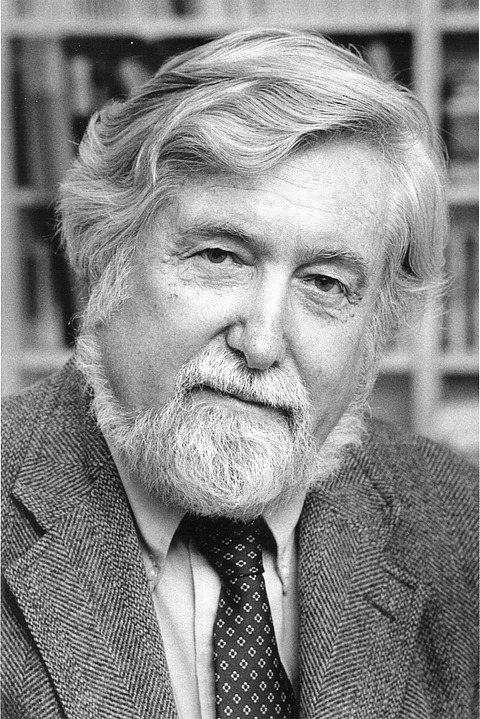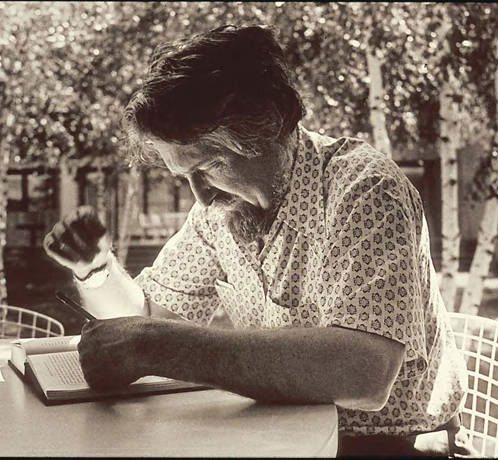Clifford Geertz: Life
Clifford Geertz, an eminent scholar in the field of cultural anthropology, was the first and founding professor in the School of Social Science. He served on the faculty from 1970 to 2006. Geertz defined the field of interpretive social science, and is regarded as one of the most influential and widely cited American cultural anthropologists of the second half of the twentieth century.

Geertz’s influence is summed up by anthropologist Sherry Ortner, in the introduction to The Fate of ‘Culture’: Geertz and Beyond:
Clifford Geertz is one of the foremost figures in the reconfiguration of the boundary between the social sciences and the humanities for the second half of the twentieth century. Drawing on his own background in philosophy and literary studies, Geertz both revived and transformed the anthropological concept of culture in such a way as to make evident its relevance to a range of humanistic disciplines. At the same time, in insisting that human social life is a matter of meaningful activity only very imperfectly studied through the objectifying methods of (certain kinds of) science, he constructed an important alternative to the then-ascendant scientism of the social sciences, an alternative that continues to grow in influence in virtually every social science discipline to this day. As a result of all this—making visible the shared ways of thinking between anthropology and the humanities, on the one hand, and offering the social sciences a powerful alternative to the seemingly irresistible juggernaut of (certain kinds of) science on the other—Geertz’s work in turn had the effect of radically repositioning the field of anthropology itself, moving it from a rather exotic and specialized corner of intellectual life to a much more central location.
Under his intellectual leadership, interpretive social science was developed and disseminated at the Institute’s School of Social Science. In an article called “Blurred Genres,” Geertz set forth his vision. “Interpretive explanation—and it is a form of explanation, not just exalted glossography—trains its attention on what institutions, actions, images, utterances, events, customs, all the usual objects of social-scientific interest, mean to those whose institutions, actions, customs, and so on they are. As a result, it issues not in laws like Boyle’s, or forces like Volta’s, or mechanisms like Darwin’s, but in constructions like Burckhardt’s, Weber’s, or Freud’s: systematic unpackings of the conceptual world in which condottiere, Calvinists, or paranoids live.” (“Blurred Genres: The Refiguration of Social Thought,” in his Local Knowledge, 1983).
Through appointments of faculty whose work embodied the interpretive turn and through formal seminars and informal exchanges among Members, critical work in the social sciences (including history) spread across the disciplines and across the globe. The publications of faculty in the School and of former Members established alternative approaches to prevailing positivist orthodoxies in the disciplines. The work of the Institute’s School of Social Science became known for its originality and critique.
Clifford Geertz was born in San Francisco, California, on August 23, 1926. After serving in the Navy from 1943 through 1945, he studied under the G.I. Bill at Antioch College in Yellow Springs, Ohio, where he first majored in English. His internship as a copyboy for The New York Post dissuaded him from becoming a newspaper man, and he switched to philosophy, partly because of the influence of philosophy professor George Geiger, "the greatest teacher I have known."
After receiving his A.B. in philosophy in 1950, Geertz went on to study at Harvard University and received a Ph.D. from the Department of Social Relations in 1956. It was a heady time, according to Geertz. "Multi- (or 'inter-' or 'cross-') disciplinary work, team projects, and concern with the immediate problems of the contemporary world, were combined with boldness, inventiveness, and a sense that things were, finally and certainly, on the move."
At this point, Geertz became involved in the multidisciplinary Modojokuto Project in Java. Sponsored by the Center for International Studies at the Massachusetts Institute of Technology, it was one of the earliest efforts to send a team of social scientists to study large-scale societies with written histories, established governments, and composite cultures. These two and a half years of Geertz’s first fieldwork were to have a lasting impact.
Geertz was a Research Assistant (1952–56) and a Research Associate (1957–58) in the Center for International Studies at MIT, and then served as an Instructor in Social Relations and as a Research Associate in Harvard University's Laboratory of Social Relations (1956–57). In 1958–59, he was a Fellow at the Center for Advanced Study in the Behavioral Sciences in Palo Alto, California.
From 1958 to 1960, he was Assistant Professor of Anthropology at the University of California at Berkeley, after which time he was Assistant Professor of Anthropology at the University of Chicago (1960–61), and was subsequently promoted to Associate Professor (1962), and then Professor (1964). He was later named Divisional Professor in the Social Sciences (1968–70). At Chicago, Geertz was a member of the Committee for the Comparative Study of New Nations (1962–70), its Executive Secretary (1964–66), and its Chairman (1968–70). Geertz was also a Senior Research Career Fellow at the National Institute of Mental Health from 1964 to 1970. In 1970, Geertz joined the permanent faculty of the Institute with the mission of establishing its fourth school. His penchant for institution-building became evident here. Weathering many a storm, he fashioned the School of Social Science as the crucible for realizing his vision of interpretive social science. In 1982, he was named Harold F. Linder Professor of Social Science. He became Emeritus in 2000.

While at the Institute, he served as a consultant to the Ford Foundation on Social Sciences in Indonesia in 1971 and devised new ways to train social scientists in that country. He was Eastman Professor at Oxford University from 1978 to 1979, and held an appointment as Visiting Lecturer with Rank of Professor in the Department of History at Princeton University from 1975 to 2000. At Princeton, his course, jointly taught with historian Robert Darnton, was legendary, and it played a determining role in bringing conceptions of culture to the work of social historians.
Geertz is the author and co-author of important volumes that have been translated into over twenty languages and is the recipient of numerous honorary degrees and scholarly awards. He received the National Book Critics Circle Prize in Criticism in 1988 for Works and Lives: The Anthropologist as Author (Stanford University Press, 1988)—unusual recognition for a practicing social scientist. He was the recipient of the Fukuoka Asian Cultural Prize (1992). The citation noted that “His intellectual honesty and profoundity of thought, along with the magnitude of his contribution to Southeast Asian studies are unequaled among his co-researchers… It is difficult to stress strongly enough the influence these concepts have had on Southeast Asian studies.” In 2002 he was awarded the Bintang Jasa Utama (First Class Merit Star) of the Republic of Indonesia. In Indonesia he is widely known as a revered and honored scholar. Over the years, he received honorary degrees from Harvard, Yale, and Princeton universities, from Antioch, Swarthmore, and Williams colleges, and from the University of Chicago and the University of Cambridge, among other institutions.
He was a Fellow of the American Academy of Arts and Sciences, the Council on Foreign Relations, the American Philosophical Society, the National Academy of Sciences, and the American Association for the Advancement of Science; a Corresponding Fellow of the British Academy; and an Honorary Fellow of the Royal Anthropological Institute of Great Britain and Ireland. Geertz was a frequent contributor to The New York Review of Books; his reviews—direct and critically engaged—were models of their kind.
Geertz died on October 30, 2006, at the age of eighty of complications following heart surgery.